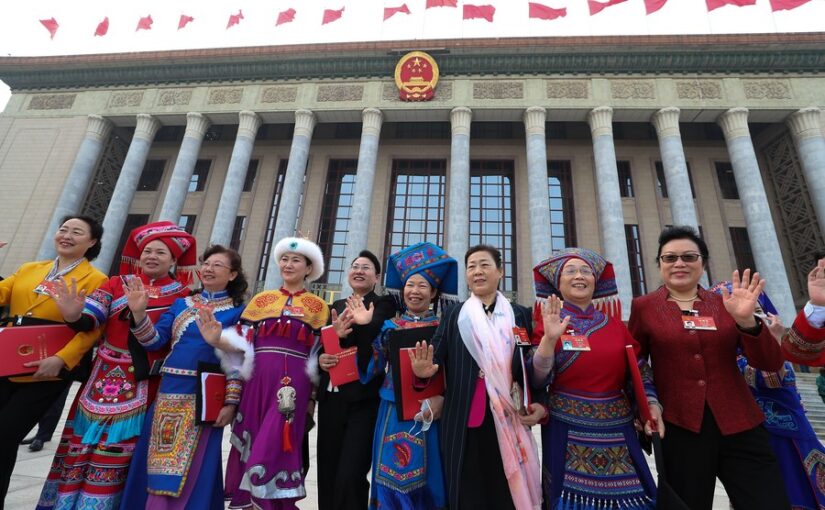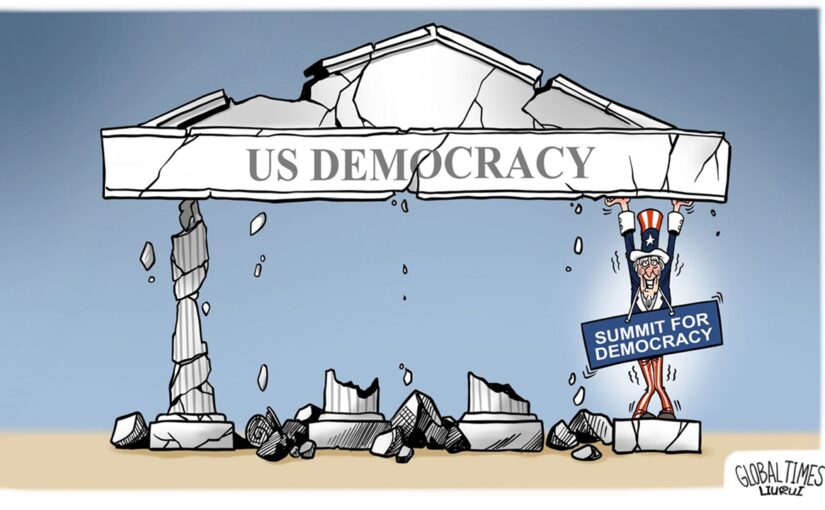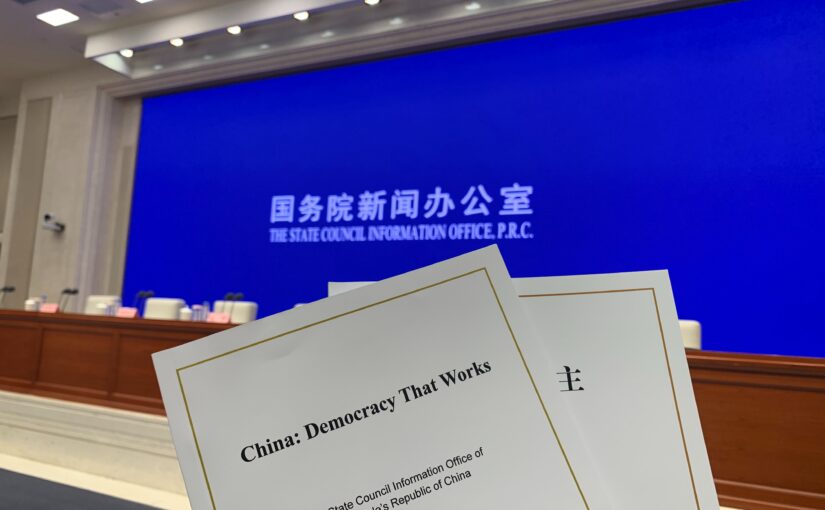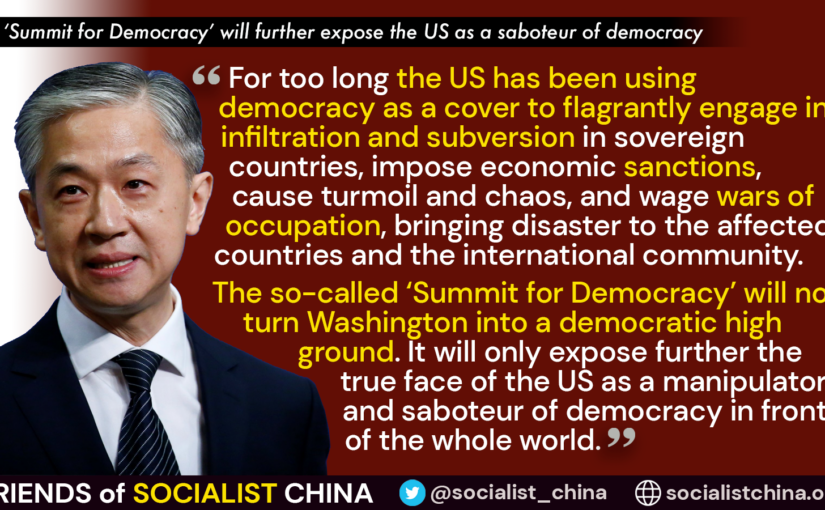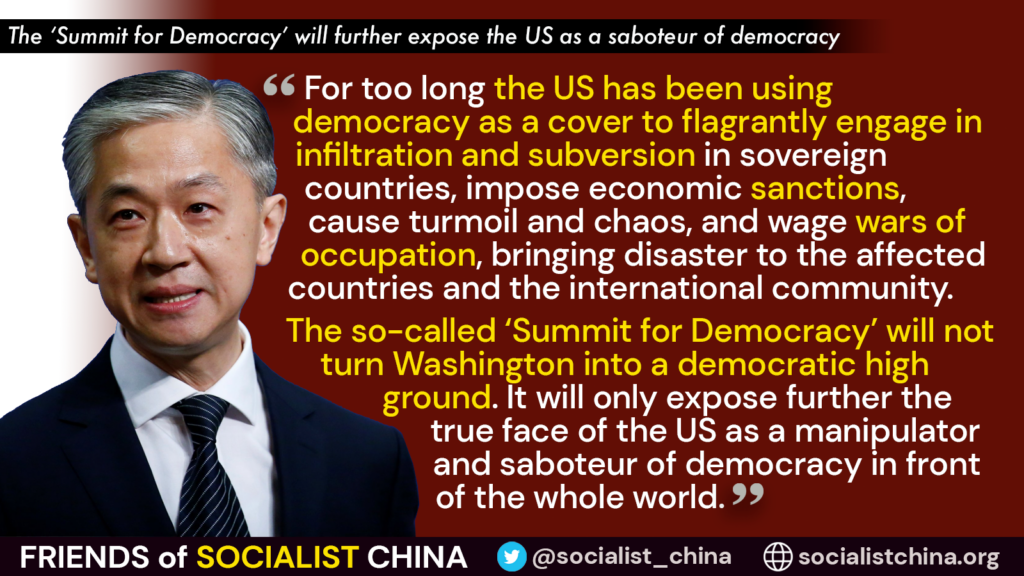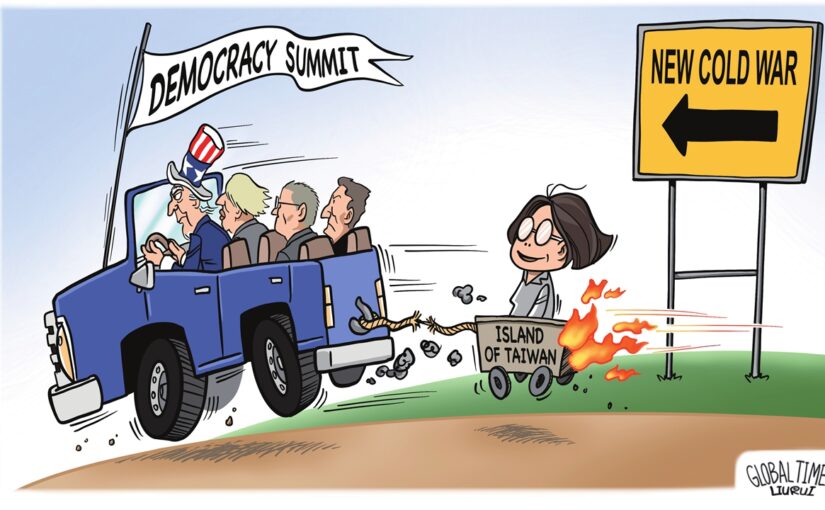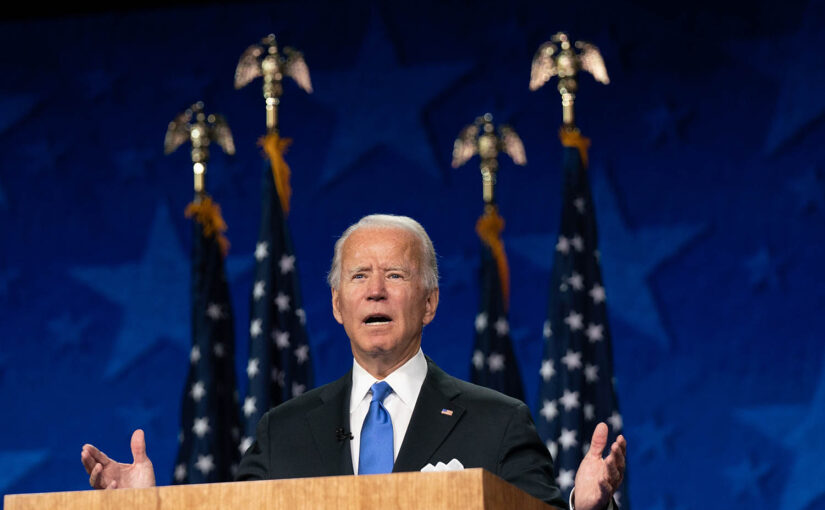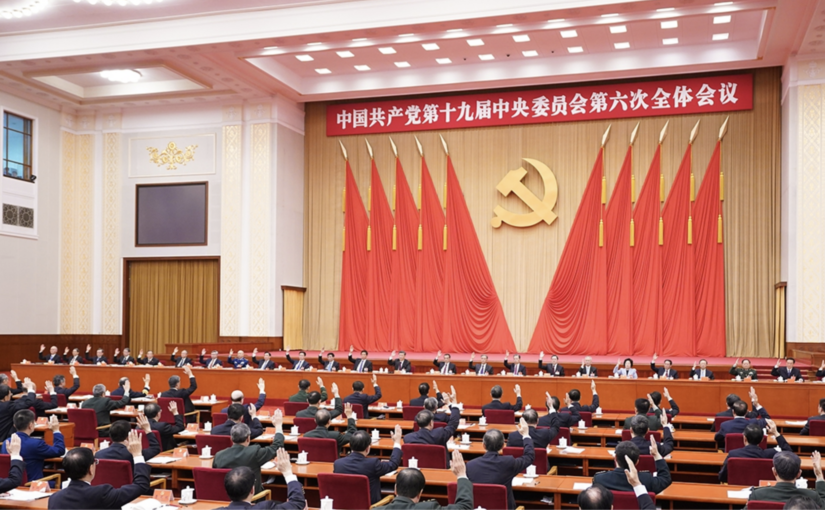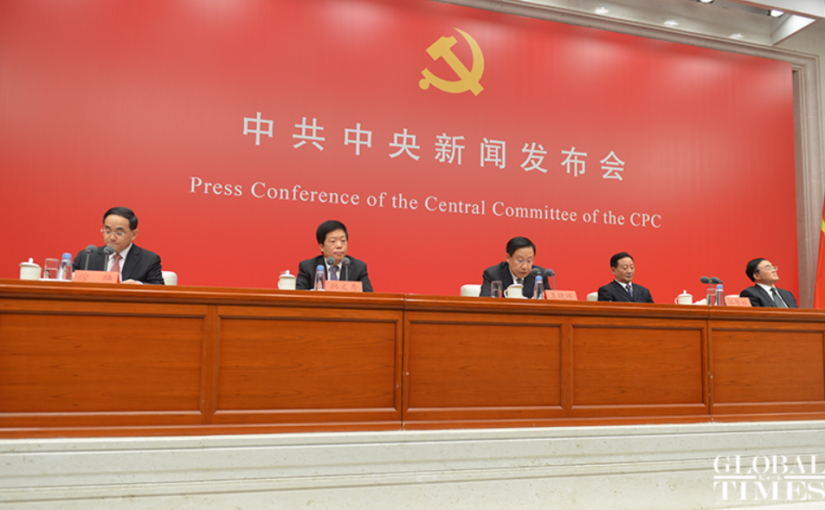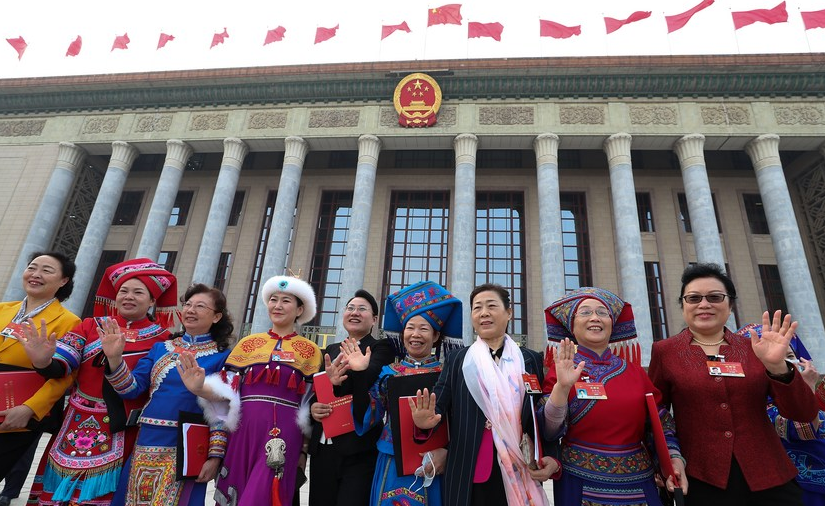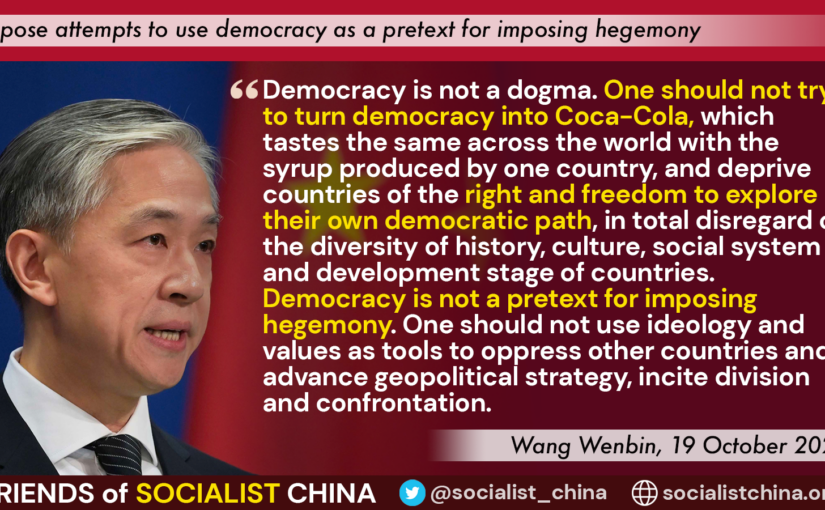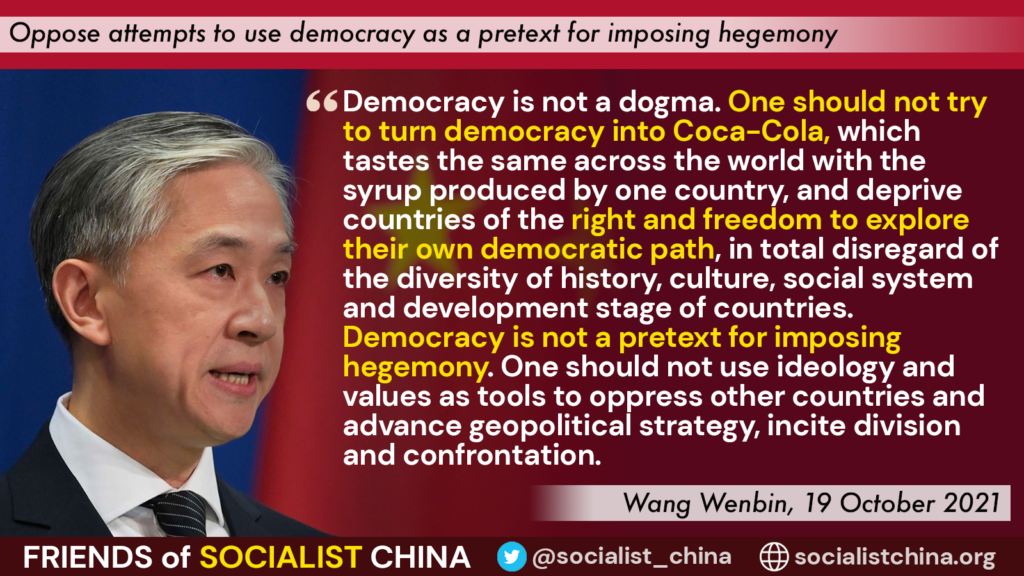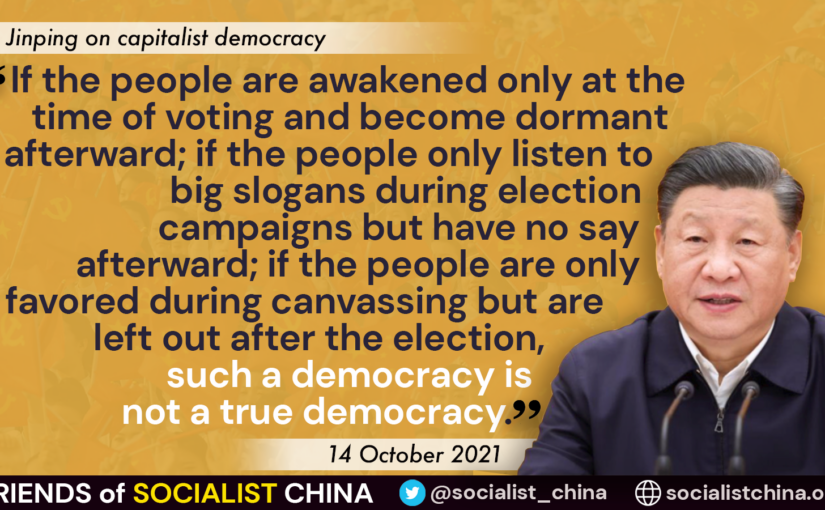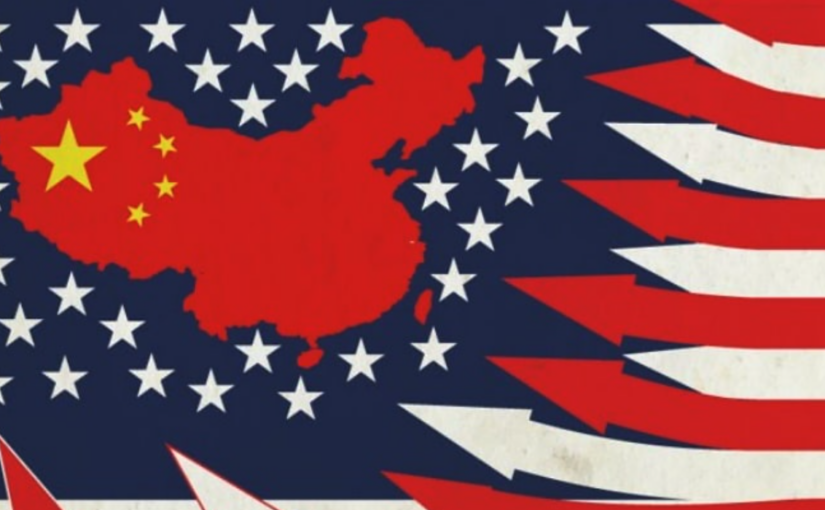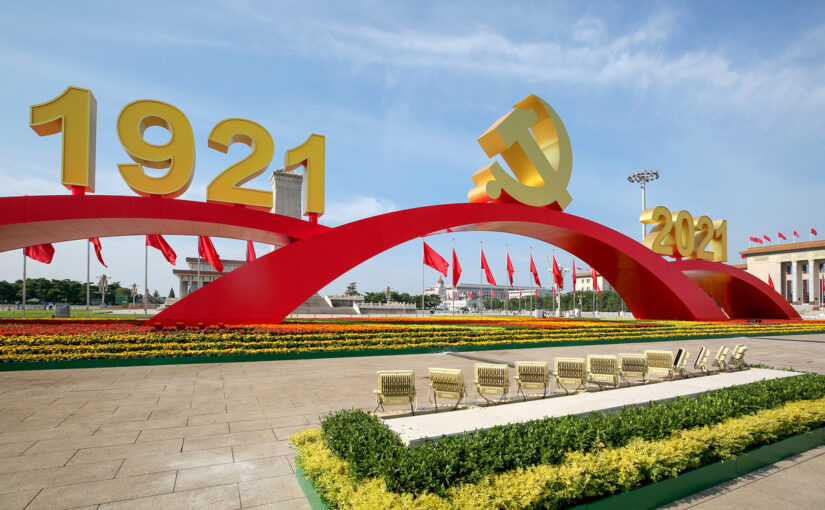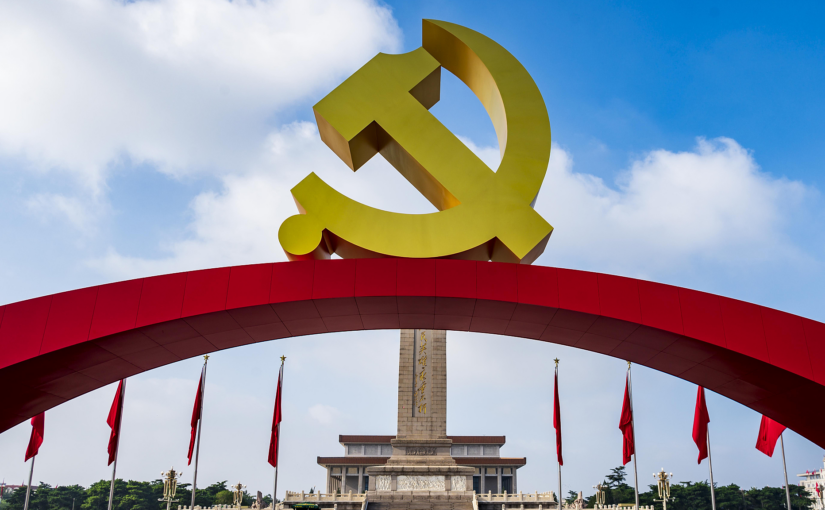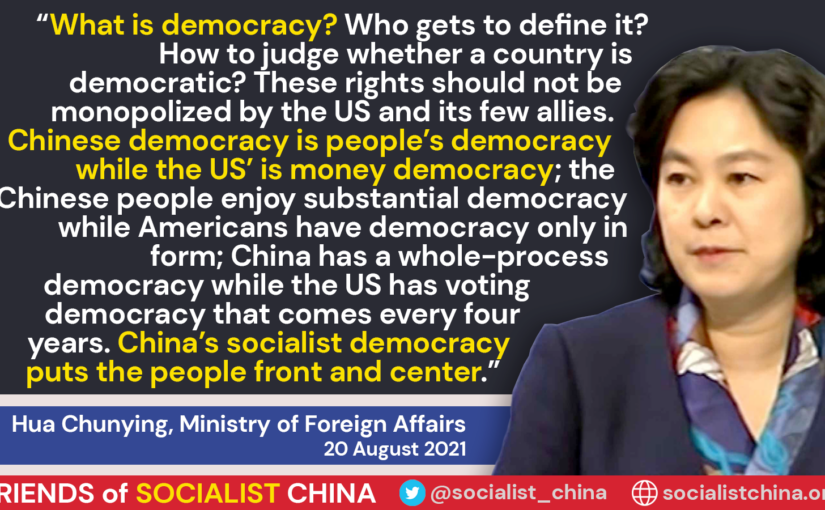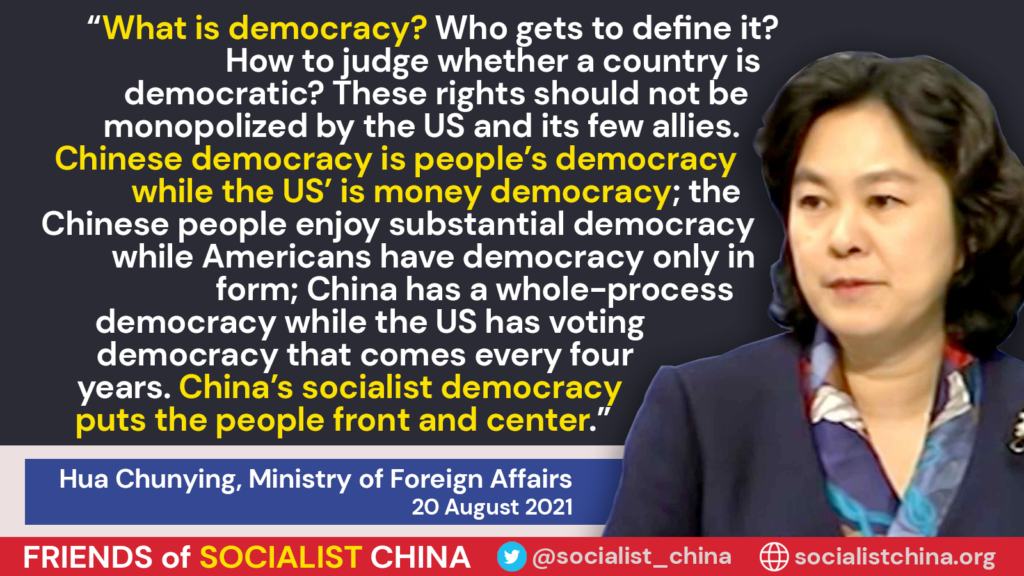We are republishing this insightful article in LA Progressive by Dee Knight (member of the DSA International Committee) comparing human and democratic rights in the US and China, and challenging the lazy, eurocentric assumptions that China is ‘authoritarian’ and that the only valid system of governance is Western capitalist democracy.
The leaders of the USA and China faced off at the United Nations General Assembly in late September, in a dramatic verbal conflict over peace, democracy, and human values. Biden said “The authoritarians of the world, they seek to proclaim the end of the age of democracy, but they’re wrong.” He added that the U.S. will “oppose attempts by stronger countries to dominate weaker ones, whether through changes to territory by force, economic coercion, technological exploitation or disinformation… But we’re not seeking a new Cold War or a separation of the world into rigid blocs…”
The UN delegates listened as Biden proclaimed the United States “is not at war” for the first time in two decades – weeks after the U.S. withdrawal from Afghanistan. He did not mention continued U.S. military occupations in Iraq, Syria, and Somalia – all of which have been deemed failures – or U.S. military presence in at least thirteen other African countries and hundreds of bases across the globe.
Biden also offered no explanation for the recent agreement with Australia and the United Kingdom to develop and deploy nuclear submarines in the Indo-Pacific region, or the “Quad” alliance with Japan, South Korea and India to threaten China with war ships and nuclear missiles. The question of U.S. sanctions against targeted enemies across the globe also was not mentioned. Neither were the activities of the National Endowment for Democracy and the Alliance for Progress to try to control internal affairs in numerous countries, including China.
Xi Jinping responded that “China has never and will never invade or bully others to seek hegemony… A world of peace and development should embrace civilizations of various forms and must accommodate diverse paths to modernization. One country’s success does not have to mean another country’s failure,” Xi continued. “The world is big enough to accommodate common development progress of all countries.”
Xi emphasized that “Democracy is not a special right reserved for any individual country but a right for the people of all countries to enjoy.”
The U.S. president did not mention his difficulties getting bills through Congress to upgrade the country’s infrastructure and provide improved basic services to people – services like health care, child care, housing and education, which are guaranteed in China, often free or at minimal cost. The “Build Back Better” bills are supported by a decisive majority of the U.S. population, but are fiercely opposed by recalcitrant right-wingers in Congress, along with “moderate” Democrats beholden to big oil and big pharma. These bills – dubbed “enormous” and unaffordable by Congressional opponents – pale in cost when compared with the military budget. At $743 billion for one year, while the infrastructure and budget reconciliation bills are for ten years, the military budget is nearly double their total for each year. (This doesn’t include military-related items, such as intelligence and veterans’ services, which bring the annual military total up above a trillion.)
An effort to pare off just ten percent of the military budget was crushed in Congress in September: a sign of the political power of the military-industrial complex, which combines with big oil, big pharma, big banks and insurance companies to dominate the U.S. political process. These same forces are helping right-wingers in both Congress and many states to quash voting rights, reversing the historic gains of the mid-century Civil Rights movement.
While the U.S. economy struggles to recover, levels of inequality reach historic proportions, and the political system is ever more polarized, Xi could point to China’s success in helping 800 million people lift themselves out of extreme poverty. A recent report noted that “In 2019, as China entered the last stages of its poverty eradication scheme, UN Secretary General Antonio Guterres said, ‘Every time I visit China, I am stunned by the speed of change and progress. You have created one of the most dynamic economies in the world, while helping more than 800 million people to lift themselves out of poverty – the greatest anti-poverty achievement in history’.”
Average wages for urban workers in China doubled between 2010 and 2020.”>China’s economic success – growing at an average rate of 9.5 percent per year, growing in size by almost 35 times (according to China’s Great Road, by John Ross), building railroads, highways, subways, even entire cities, to become the second largest economy in the world – didn’t happen without strain. Inequality increased, and some worried that the new “market socialism” was a lot like capitalism. The poverty eradication campaign was essential, just as efforts to restrain big capitalists were as well. These efforts were possible in large part due to the Chinese approach to democracy. As Xi said:
What we now face is the contradiction between unbalanced and inadequate development and the people’s ever-growing needs for a better life… The needs to be met for the people to live better lives are increasingly broad. Not only have their material and cultural needs grown; their demands for democracy, rule of law, fairness and justice, security, and a better environment are increasing.
How China’s leaders intervened is an illustration of China’s democratic path. A report from Harvard University’s Ash Center for Democratic Governance and Innovation finds over 90% of the Chinese people like their government, and “rate it as more capable and effective than ever before. Interestingly, more marginalized groups in poorer, inland regions are actually comparatively more likely to report increases in satisfaction.” It says Chinese people’s attitudes “appear to respond to real changes in their material well-being.”
This contrasts with people’s attitudes in the United States, which are polarized politically, racially, and economically. Public trust in the U.S. government is in crisis. There are very real human rights concerns, with police killings, homelessness and mass incarceration at pandemic proportions. A new report says police killings in the U.S. have been undercounted by more than half during the past four decades. Of nearly 31,000 people killed by police during that period, more than 17,000 were unaccounted for in official statistics. Black people were 3.5 times as likely to be killed by the police as white people. Latinx and indigenous people also suffered higher rates of fatal police violence than white people.
Chinese democracy
The Chinese revolution itself was fundamentally democratic – abolishing feudalistic hierarchy and privilege, equalizing gender differences, and enabling poor workers and farmers to be involved in national administration. The Ash Center study includes an important essay, “Democracy in China: Challenge or Opportunity?” by Yu Keping, director of the China Center for Comparative Politics and Economics. Yu Keping says “Western scholars use their democratic standards, such as a multi-party system, universal suffrage, and checks and balances, to evaluate Chinese political development,… and conclude that Chinese reform is more economic than political.” This, he says, is an unnecessary bias and misunderstanding.
The basics of Chinese democracy are people’s congresses at local, provincial and national levels. A Global Times report says “according to the State Council, ‘Deputies to the people’s congresses of cities not divided into districts, municipal districts, counties, autonomous counties, townships, ethnic minority townships and towns are elected directly by their constituencies. Deputies to the NPC [National People’s Congress] and the people’s congresses of the provinces, autonomous regions, municipalities directly under the Central Government, cities divided into districts, and autonomous prefectures are elected by the people’s congresses at the next lower level.’ These elections are all competitive.”
There are also regular consultations between government officials and the people at all levels. Key principles are “people-oriented government, human rights, private property, rule of law, civil society, harmonious society, government innovation, and good governance,” Yu Keping wrote.
The Chinese Communist Party (CCP) is at the core of all this. Its 95 million members make it a preponderant factor in Chinese society. There are eight non-communist political parties, with which the CCP consults regularly. But CCP members lead society. The guiding slogan is “serve the people.” The story of the poverty eradication campaign provides a good example:
The targeted phase of poverty alleviation required building relationships and trust between the Party and the people in the countryside as well as strengthening Party organization at the grassroots level. Party secretaries [were] assigned to oversee the task of poverty alleviation across five levels of government, from the province, city, county, and township, down to the village… Three million carefully selected cadres were dispatched to poor villages, forming 255,000 teams that reside there. Living in humble conditions for generally one to three years at a time, the teams worked alongside poor peasants, local officials, and volunteers until each household was lifted out of poverty. In this process, many cadres were unable to return home to visit families for long stretches of time; some fell ill in the harsh natural conditions of rural areas and more than 1,800 Party members and officials lost their lives in the fight against poverty. The first teams were dispatched in 2013; by 2015, all poor villages had a resident team, and every poor household had an assigned cadre to help in the process of being lifted, and more importantly, of lifting themselves out of poverty. At the end of 2020, the goal of eliminating extreme poverty was reached.
The study says the “cadres and officials who have mobilized in the countryside have been essential in building public support for and confidence in the Party and the government.”
The government’s effective response to the COVID-19 pandemic continued to build public support. Shortly after Wuhan emerged from the COVID-19 lockdown, York University Professor Cary Woo led a survey of 19,816 people across 31 provinces and administrative regions. Published in the Washington Post, the study found that 49 percent of respondents became more trusting of the government following its response to the pandemic, and overall trust increased to 98 percent at the national level and 91 percent at the township level.
“The Chinese way of political development,” Yu Keping says, “is extremely different from the Western democratic tradition… Consequently, it is almost dead-end to explain the Chinese way of democratic politics through using existing Western democratic theories.” Democracy means “government by the people,” the professor says. So “the fundamental criteria to judge whether a country is a ‘democracy’ or not is government’s responsiveness to its citizens… As long as a country has formal institutions to guarantee that government policies can effectively reflect the public’s opinions, that citizens can participate in political life, and the incumbent political regime has to respond to people’s interests, it can be considered democratic regardless of the particular party systems, election procedures, or power separation mechanisms.”
Western Challenges
Former U.S. Secretary of State Mike Pompeo admitted in 2019 that “We lied, we cheated, we stole… It’s part of the glory of the American experiment.” Pompeo’s claims that the Chinese Communist Party is “the greatest danger” to democracy in the world, and that China’s to blame for the COVID-19 pandemic have served to discredit the U.S. position rather than strengthen it. Biden, Secretary of State Blinken and most in Congress, to their shame, are continuing Pompeo’s infamous campaign. Despite hundreds of millions of U.S. funds to support protests in Hong Kong, that effort has fizzled. Hong Kong ranks in the top three on the Fraser Human Freedoms Index, while the U.S. is in 17th place. (An earlier LA Progressive article provides additional information.)
Regarding claims of “genocide” in Xinjiang, Columbia University Professor Jeffrey Sachs, a special advisor to the UN Secretary General, says “The US government has offered no proof, and unless it can, the State Department should withdraw the charge.” Code Pink webinars have demolished U.S. anti-China claims. Using these lies and false accusations, the U.S. has imposed sanctions and launched an international boycott of products made in Xinjiang. The main result has been to hurt the people of Xinjiang. But the smear campaign has also confused many progressives and so-called “leftists” in the U.S., who have fallen victim to the continued repetition of these lies in the mainstream media.
China has answered the U.S. slander campaign with claims of its own. In late September it called on the UN Human Rights Council to “work to eliminate the negative impacts of colonialism on people around the world.” The statement, issued with 21 other countries, said “Economic exploitation, inequality, racism, violations of indigenous peoples’ rights, modern slavery, armed conflicts and damage to cultural heritage are among the legacies of colonial repression.” In a separate statement, China “called for nations that have conducted illegal military interventions to pay reparations. Without naming any states, he pointed out that such action had severe consequences for social and economic development.”
“A democratic system is a marriage of universality and particularity,” Professor Keping says. “We cannot make arbitrary conclusions that democracy has only one model merely based on the assumption that democracy is a universal value and has common features… The nature of democracy is government by the people or ‘people become their own masters,’ which is reflected in a series of institutions and mechanisms that guarantee the citizens’ democratic rights… Chinese democracy, growing out of Chinese tradition and society, will not only bring good fortune to the Chinese people, but also contribute greatly to the advancement of democratic theory and practice for all mankind.”


